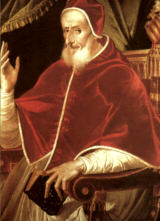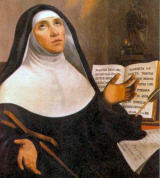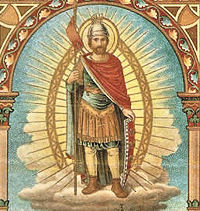Easter: April 30th
Wednesday of the Second Week of Easter; Opt. Mem. of St. Pius V, Pope and Religious
Other Commemorations: St. Marie de l'Incarnacion, Religious (RM; Optional Memorial, CAN); St. Quirinus of Neuss (RM)
» Enjoy our Liturgical Seasons series of e-books!
Today is the Optional Memorial of St. Pius V (1504-1572). He joined the Dominicans at the age of fourteen; he was sixty-two when he was elected Pope. His reign, though short, was one of the most fruitful of the sixteenth century. To Protestantism, which had proclaimed the Reformation, St. Pius replied by applying the decrees of the Council of Trent for the reform of the Church. He played a great part in the return of the clergy to ecclesiastical discipline. Against Islam, which threatened the West, he succeeded in forming a coalition of Christian forces: and by public prayers, organized everywhere at his request, he was instrumental in obtaining the decisive victory of Lepanto in 1571. He died the following year on May 1. We also owe to St. Pius the reformation of the liturgical books of the Roman Rite.
The Church in Canada celebrates the Optional Memorial of St. Marie of the Incarnation (1599-1672). Commanded by a vision to become a missionary in Canada, in 1639 Marie Guyart de Incarnation arrived in what would become Quebec City. By 1642, Marie had built a convent, establishing the first Ursuline school in New France. Her talents as a business administrator enabled the convent to survive against enormous financial odds. Marie worked as a missionary to the Natives and other residents in the area. She studied the local languages with the local Jesuits and became so proficient that she later wrote Algonquin, Iroquois, Montagnais, and Ouendat dictionaries, and a catechism in Iroquois. She was canonized by Pope Francis in 2014.
The Roman Martyrology also commemorates St. Quirinus of Neuss (d. 489), Roman tribune and martyr.
Meditation for Wednesday of the Second Week of Easter
God so loved the world that he gave his only son, that whoever believes in him should not perish but have eternal life.
With these words of the Gospel of the Mass we are shown how the Passion and Death of Jesus Christ is the supreme manifestation of God’s love for men. He took the initiative in love, surrendering for us him whom He loves most, in whom He is well pleased—his own Son. Our faith is a revelation of his goodness, of the mercy, of the love of God for us. God is love (cf 1 John 4:16), that is to say, love which is diffusive and is lavish: and everything is summarized in this great truth which explains everything and illuminates everything. It is necessary to see the history of Christ in this light. ‘He loved me’, writes St. Paul and each one of us can and should repeat the same to himself: ‘He loved me and sacrificed Himself for me’ (Gal 2:20). (Pope St. Paul IV, Homily on the Feast of Corpus Christi,13 Jun 1975).
The love of God for us reaches its climax in the Sacrifice of Calvary. God held back Abraham’s arm when he was on the point of sacrificing his only son, but He did not hold back the arm of any of those who were nailing His Only-Begotten Son to the Cross. Therefore St. Paul exclaims, filled with hope: He who did not spare his own Son…will he not give us all things with him? (Rom 8:32).
The self-giving of Christ constitutes a pressing call for correspondence with that love: love is repaid with love. Man was created in the image and likeness of God. And God is Love. Therefore the heart of man is made for love and the more he loves the more he becomes identified with God; only when he loves can he become happy. And God wishes us to be happy, here on earth too. Man cannot live without love.
Personal holiness is not centered in the fight against sin but in love for Christ, who shows Himself to us as being truly human, fully aware of everything about us. The love of God for men and of men for God is a love of mutual friendship. And one of the specific characteristics of friendship is relationship. In order to love Our Lord it is necessary to know Him, to speak to Him. We get to know Him by meditating on His life in the Holy Gospels. In them He shows Himself to us as being endearingly human and very close to our life. We meet Him in prayer and in the Sacraments, especially in the Blessed Eucharist.
Meditation on the Most Sacred Humanity of Our Lord—especially when we read the Gospel and when we consider the Mysteries of the Rosary—constantly nourishes our love of God and constitutes a living teaching as to how we have to sanctify our day. In his hidden life, Jesus wished to descend to the most common things of human existence, to the daily life of a manual worker to supports a family. And so we see him during almost the whole of His life working day after day, caring for his tools in the small workshop, dealing simply and in a friendly way with the neighbors who came to ask Him to make a table for them or a rafter for a new house, caring for his Mother with great affection. That is how He fulfilled the will of his Father God during those thirty years. When we look at his life, we learn to sanctify our own work, our family, our friendships. Everything that is truly human can be holy, can be a channel for our love of God, because Our Lord on assuming our human nature, sanctified it.
—Francis Fernandez, In Conversation with God, Daily Meditations Volume Two: Lent-Holy Week-Eastertide
St. Pius V
 In December of 1565, Pope Pius IV died. His one monumental achievement was the resumption and successful conclusion of the Council of Trent. The man chosen to succeed Pius IV and upon whose shoulders rested the responsibility for carrying out the decrees of the council was Michael Ghislieri, a Dominican friar. It was the late pontiff's nephew St. Charles Borromeo who had been the driving force in the election of the new pope, for he recognized that a remarkable leader would be needed if the decrees of the council were to bear fruit.
In December of 1565, Pope Pius IV died. His one monumental achievement was the resumption and successful conclusion of the Council of Trent. The man chosen to succeed Pius IV and upon whose shoulders rested the responsibility for carrying out the decrees of the council was Michael Ghislieri, a Dominican friar. It was the late pontiff's nephew St. Charles Borromeo who had been the driving force in the election of the new pope, for he recognized that a remarkable leader would be needed if the decrees of the council were to bear fruit.
Michael Ghislieri was a poor shepherd boy who entered the Dominicans at the age of fourteen, became a lecturer in philosophy and theology at Pavia, and very early became involved in the reform movement in the Church. His reforming labors brought him to the attention of other members of the reform movement, and he was given important positions in Como, Bergamo, and Rome. In 1556, he was consecrated bishop of Sutri and Nepi, and then to the diocese of Mondevi, lately ravaged by war. In a very short time, the diocese was flourishing and prosperous. His views on reform were often asked by the Holy Father, and he was noted for his boldness in expressing his views.
His holiness and austerity of life were notable, and he succeeded in bringing simplicity even into the papal household. He refused to wear the flowing garments of previous popes and insisted upon wearing his white Dominican habit even as head of the Church. To this day, the pope wears white, a custom begun by this Dominican pontiff.
The announced intention of St. Pius V was the carrying out of the decrees of the Council of Trent. He insisted that bishops reside in their diocese under pain of losing their revenues; he made a systematic reform of religious orders, established seminaries, held diocesan synods, and reformed the Breviary and Missal. He brought unity into divine worship, published catechisms, ordered a revision of the Latin Vulgate and revitalized the study of theology and canon law. During his pontificate, the Turks were definitively defeated at the battle of Lepanto, due, it was said, to the prayers of the pope.
Pius V died in 1572, at the age of sixty-eight, deeply grieved by the troubles besieging the whole Church. He was canonized by Pope Clement XI in 1712.
Patronage: in Italy: diocese of Alessandria; Bosco Marengo; Cattolica; Pennabilli
Highlights and Things to Do:
- Read more about St. Pius V:
- See Christian Iconography for images of Pius V.
- Read about the Council of Trent. Read the decrees issued by the Council or read the Canons on Justification with a summary of their teachings.
St. Marie de l'Incarnacion
 Her name was originally Marie Guyard, born in Tours, France. At age 17 she entered into an arranged marriage and bore a son, Claude. Only two short years later her husband died. in January 1631 she asked her sister to care for her son Claude, and then joined the Ursulines at Tours, France.
Her name was originally Marie Guyard, born in Tours, France. At age 17 she entered into an arranged marriage and bore a son, Claude. Only two short years later her husband died. in January 1631 she asked her sister to care for her son Claude, and then joined the Ursulines at Tours, France.
After being inspired in a vision, she begged to go to Canada or New France. The authorities gave her and another nun (Marie-Madeleine de la Peltrie) permission to go to New France to work among the Native Americans. In 1639 she arrived in Quebec. She was the first superior of the Ursulines in Canada. She administered her house with great success and worked among the Native Americans with notable results. She studied the local languages with the Jesuits who were already in the area and became so proficient that she later wrote Algonquin, Iroquois, Montagnais, and Ouendat dictionaries, and a catechism in Iroquois. She died of hepatitis in Quebec, Canada. Over 12,000 of her letters have survived, which are valuable sources of French Canadian history.
Marie was beatified by Pope St. John Paul II on June 22, 1980 and canonized by Pope Francis on April 2, 2014.
—Adapted by A. Repplier, Mère Marie of the Ursulines (1931).
Highlights and Things to Do:
- Learn more about St. Marie de l'Incarnacion:
- Read this longer biography of St. Marie de l'Incarnacion from Dictionary of Canadian Biography.
- 2022-2023 was the 350th anniversary of Sr. Marie's death and this site had many sources for commemoration.
St. Quirinus of Neuss
 Little is known about St. Quirinus of Neuss, but legend relates that he was a Roman tribune as well as Pope Alexander I's jailer. He converted to Christianity along with his daughter, St. Balbina. He is credited with translating St. Peter's chains to Rome from Jerusalem. St. Quirinus was martyred during the persecution of Emperor Hadrian shortly before the martyrdom of Pope Alexander (who is mentioned in the Roman Canon and who is credited with instituting the blessing of holy water and the mixing of water and wine at Mass). Quirinus was buried on the Via Appia in the Praetextatus Catacomb. In 1050, Pope Leo IX gave St. Quirinus' relics to his sister, Gepa, who was the abbess of Neuss, on the Rhine River, where there is a Romanesque church bearing his name. St. Quirinus is the patron of Neuss and a minor patron of Orte, in the Italian province of Umbria.
Little is known about St. Quirinus of Neuss, but legend relates that he was a Roman tribune as well as Pope Alexander I's jailer. He converted to Christianity along with his daughter, St. Balbina. He is credited with translating St. Peter's chains to Rome from Jerusalem. St. Quirinus was martyred during the persecution of Emperor Hadrian shortly before the martyrdom of Pope Alexander (who is mentioned in the Roman Canon and who is credited with instituting the blessing of holy water and the mixing of water and wine at Mass). Quirinus was buried on the Via Appia in the Praetextatus Catacomb. In 1050, Pope Leo IX gave St. Quirinus' relics to his sister, Gepa, who was the abbess of Neuss, on the Rhine River, where there is a Romanesque church bearing his name. St. Quirinus is the patron of Neuss and a minor patron of Orte, in the Italian province of Umbria.
—Excerpted from 2009 Saints Calendar and Daily Planner published by Tan Books
Patronage: Neuss, Germany; Correggio, Italy; invoked against bubonic plague, smallpox, gout, paralysis, goiter; skin conditions; afflictions affecting legs, feet, and ears; disease affecting cattle and horses; animals; knights, soldiers and horsemen
Symbols and Attributes: military attire; knight with lance, sword, hawk; banner or sign with nine balls
Highlights and Things to Do:
- Read more about St. Quirinus:
- St. Quirinus is included as a subset of the Four Holy Marshals, Quirinus of Neuss, Hubert of Liege, Cornelius, and Anthony the Great. See August 8 for more details.
- His relics are located in San Quirino Basilica in Neuss.
- St. Quirinus is one of the "weather saints" in Germany. His former feast day on March 30 was the saying "Wie der Quirin, so der Sommer" ("As St. Quirinus' Day goes, so will the summer").






